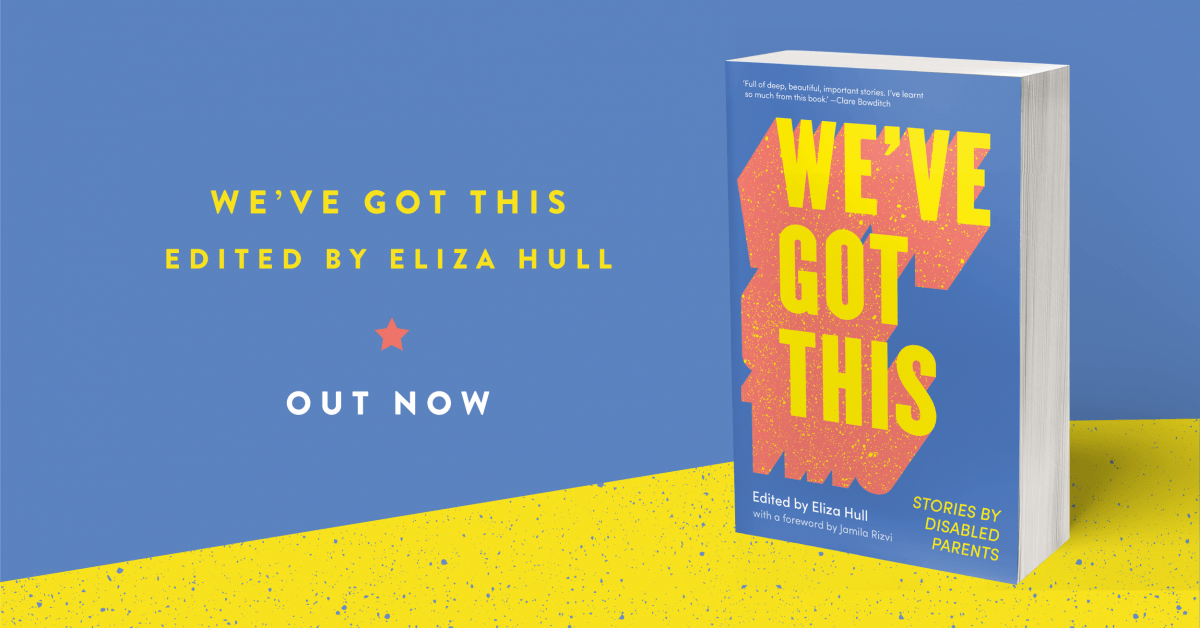“Being a disabled parent is a rebellious act.”
Niamh Taylor reviews We’ve Got This Edited by Eliza Hull, the first essay collection of its kind, which brings together the voices of thirty disabled parents, some of whom also identify as queer, non-binary, Indigenous, Deaf, chronically ill, neurodivergent or with an intellectual disability.
Through a combination of essays and written interviews, parents share their personal stories of twenty-first century disabled parenting: stories of struggle, joy, resistance, community, grief, innovation and ultimately, of love.
“…a revelatory, quietly radical book; a comforting and empowering resource that, until now, has not existed for the 1.7 million disabled parents in the UK, or the more than 4.8 million households in the US who have a disabled parent.” Niamh Taylor
Read the full review below:
I think the existence of this book is a rebellious act in itself. Edited by Eliza Hull, We’ve Got This is the first essay collection of its kind, bringing together the voices of thirty disabled parents, some of whom also identify as queer, non-binary, Indigenous, Deaf, chronically ill, neurodivergent or with an intellectual disability.
Through a combination of essays and written interviews, they share their personal stories of twenty-first century disabled parenting: stories of struggle, joy, resistance, community, grief, innovation and ultimately, of love. The fact that the pieces all stand alone is worth noting when considering accessibility as a reader; the book can be read in any order and at any pace.
The author’s picture and biography come at the end of each piece, rather than the beginning, which turned out to be a helpful tool in identifying and challenging
unconscious assumptions as I read. On several occasions, I found myself having to alter an image I was automatically building of a person; suddenly, I would discover they had dwarfism, or they used a wheelchair; they identified as Indigenous, or non-binary. I think this format strengthens the work this collection does as a whole: unpicking stereotypes and challenging the ableist lens through which we may not even know we are viewing the world.
The book’s introduction poses questions such as ‘How do parents who are blind push a pram? … How do parents who are Deaf know their baby is crying in the night?’ and we know, as readers, that we will get the answers to these questions. We are going to learn from this book – this is clear from the outset.
Contributors deconstruct stereotypes about disabled people and parenting and disclose intimate details of their lives in the hope of bettering society, building community and shifting narratives. In my view, the result is a revelatory, quietly radical book; a comforting and empowering resource that, until now, has not existed for the 1.7 million disabled parents in the UK, or the more than 4.8 million households in the US who have a disabled parent.
Perhaps in part due to a lack of representation and information, internalised ableism is a common thread weaving throughout these chapters. As a disabled person, I found this oddly comforting. I am not exactly glad that thirty other disabled people experience this same confusing phenomenon, but it helps to know that I am not the only one still learning about myself and my community – or should I say, still un-learning.
Internalised ableism seems to be the irksome fly that we disabled people are all aware of to some degree, but can’t quite bat away – it certainly crops up time and time again in this collection. Kristy Forbes, a late-diagnosed autistic mother of autistic children, acknowledges its impact. As she learns to navigate and advocate for her own needs, she is trying to do the same for her family, but internalised ableism caused her ‘deep denial about [her] challenges’ and she ‘wouldn’t allow [herself] accommodations because [she] thought that was weakness.’
Reading Forbes’ comments on viewing accommodations as weakness was confronting for me. I considered, how often do I still repress my social, emotional, physical or physiological needs in favour of upholding ableist norms? How many others are doing this same thing?
Nina Tame writes about forcing herself to use crutches instead of a wheelchair, purely because her internalised ableism viewed wheelchair use as a ‘total horror show’ or an ‘end-of-the-line decision’. And by many in the public arena, wheelchair use is viewed as such – so much so that when, just a couple of weeks ago, actor Ruth Madeley (a wheelchair user with spina bifida) crossed her legs in an episode of Doctor Who, non-disabled people took to social media about what they perceived to be a ‘continuity error’. Disabled people are well-used to scrutiny and judgement, to having our bodies debated or categorised or mocked by those who know nothing about them. It is no wonder disabled people, such as Tame, have internalised this harmful rhetoric.
Terminology – how we talk about disability – matters here, too. In the introduction to We’ve Got This, Hull discusses her conflict around using the term ‘disabled’. The word ‘disabled’ should never be loaded with such negative connotations that medical professionals dealing with new parents suggest pregnancy terminations; ask invasive, prejudiced questions; screen unsolicited for disabilities in foetuses; mistreat and demean patients in hospital; or express sadness and sympathy when a child is born disabled – all experiences unfortunately detailed in this essay collection.
But the word ‘disability’ should not necessarily have extreme positive connotations either, such as the idea of the inspirational ‘supercrip’ Lucy and James Catchpole write about. James is a male amputee, but Lucy’s disability and pain were invisible to many (before she became a full-time wheelchair user), causing her to describe herself as a ‘category error’ in terms of public perception. James writes: ‘She could pass as non-disabled, but needed a great many accommodations from society, for which she had to fight and fight. I looked properly disabled – no doubting my credentials – but needed nothing, and had to work hard to persuade old ladies not to offer me their seats on the bus.’ This short paragraph tells us so much about society’s assumptions when it comes to disability.
Lucy also describes feeling the need to ‘perform femininity’ in order to keep doctors and midwives on side when she was pregnant. Even more interestingly, though, she reveals a surprising change in how she was perceived postnatally, as a new mother: ‘Is it … only now that I’ve gone through pregnancy and birth that my perception of pain is accepted as valid?’
I found this question fascinating, especially when considering invisible disability – something I myself experience. Another contributor, Jasper Peach shares how their invisible disability ‘makes them feel invisible’, and I hear that, too. Having to constantly advocate for needs that others do not understand, perceive or therefore even believe in is both harmful and exhausting. It also has the potential to isolate, and silence – making the existence of this book all the more significant.
Being a disabled parent is a rebellious act.
The particular brand of ableism that Lucy draws our attention to here is further encouraged and sustained by misogyny, of course – a culmination of the restrictive, destructive binaries around which society seems to form all opinions and dictate how life must be lived. Peach, who identifies as non-binary, is multiply marginalised simply by existing outside of these ableist, hetero-oppressive norms. Oh, hurray for enforced binaries! In her piece, Liel K. Bridgford tellingly writes: ‘I wanted to be the best possible mother for my child, and I thought that meant being non-disabled.’
The unpicking of our so-called parenting ideal makes for maddening reading, not least because it is toxic and oppressive to all. We expect parents (especially mothers) to be autonomous – or at least to appear to be so. It’s rarely acceptable to openly need or ask for support as an adult, never mind as a parent – especially in Westernised capitalist culture, which idealises an independent, machine-like way of life. Bridgford, who moved to Australia from Israel, describes the cultural shock of feeling ‘more disabled’ in Australia, despite progression in attitudes, because she found that ‘society expected new mothers to perform the work of an entire village’.
Ableist society assumes that if one needs care, they cannot give care.
In her introduction, Hull has already reminded us that ‘coercive or forced sterilisation is still an ongoing practice in Australia’ and ‘in the United States … laws allowing forced sterilisation exist in thirty-one states, as well as Washington, D.C.’. As I’ve noted, many of the contributors in this collection describe being offered terminations upon learning that their child will be disabled.
I was further horrified to read that up to 80% of intellectually disabled parents in the Western world (including the UK and USA) will have their children removed from them. In his and his wife’s interview for We’ve Got This, Ricardo Thornton likens growing up in institutions in America to ‘prison’. Thornton’s older siblings were already in the institution when he arrived, aged seven; his sister later died there. He wrote that she was ‘drugged up like a zombie’ by the staff, so they could ‘control her’.
Despite harrowing content such as this, Donna and Ricardo’s story is infused with resilience, joy and pride; it is beautiful to read about the life and the family they fought to make together. They should not have had to fight.
The seemingly inevitable ‘pain’ and ‘prejudice’ faced by disabled people cannot be shied away from. In his piece, Sam Drummond ponders the grief he might feel if his child is born disabled, like himself. He actively engages in disability pride; he does not view disability as a deficit, a disappointment or a burden; but he is realistic about the harsh realities of systemic ableism. It weighs on him as the birth of his child approaches.
But also – crucially – another form of potential grief troubles Drummond: what if she is not disabled? In that eventuality, he would be mourning ‘the part of her life that will miss out on the wonderful perspective and experiences that disability can bring.’ Because, yes, being disabled presents a whole host of challenges – many of which, this book teaches us, ‘lie in other people’s attitudes’ – but that doesn’t mean we can’t celebrate its ‘richness’ – especially when it comes to disabled parenting.
Rebekah G. Taussig writes in the final essay of the collection that disability is often imagined as an ‘unequivocal loss,’ while becoming a parent is seen as a ‘net gain;’ and therefore, the two states must be ‘incompatible’. But, ‘to sit at the intersection
between disability and parenting’ is, to Taussig, to ‘feel the similarities wash over [her]’.
With some of the most moving, masterful writing in the collection, Taussig goes on: ‘My body and my baby are both unpredictable … They flourish when we lean into flexibility, imagination and adaptability … they nurture a tender, sturdy intimacy in our family; they are bewildering, magical and demanding.” Of disability and parenting, she asks, as I believe we all should, ‘Isn’t it interesting to see them pulled apart and pushed into such opposing categories?’
The voices that make up We’ve Got This tell us in no uncertain terms that disabled parents offer so much: the ability to adapt and learn; to centre and celebrate difference; create safe spaces; advocate and fight against oppression; make difficult choices; think creatively; find solutions; and forge community and connection.
I will say it again: this book is a rebellious act.


no replies